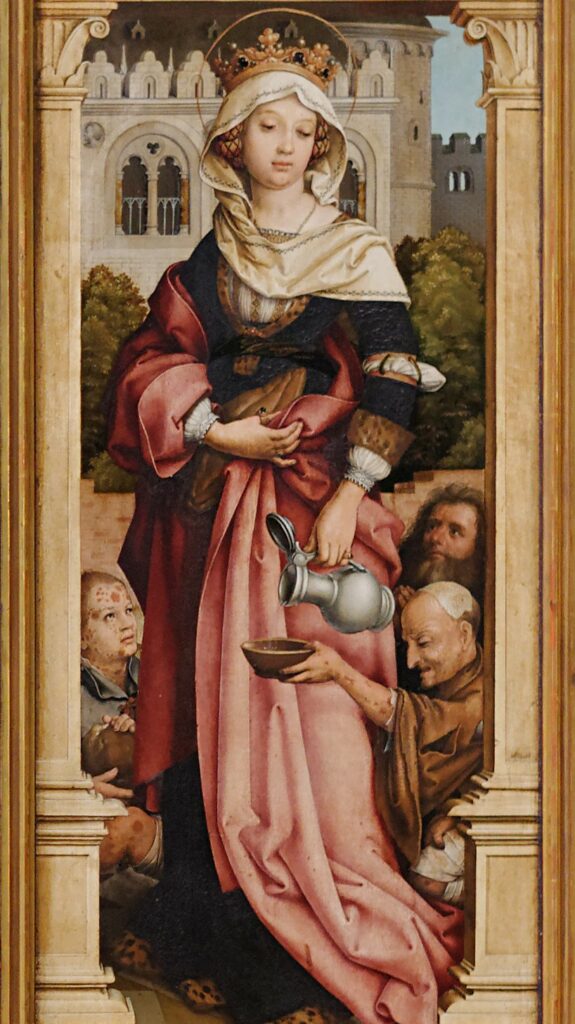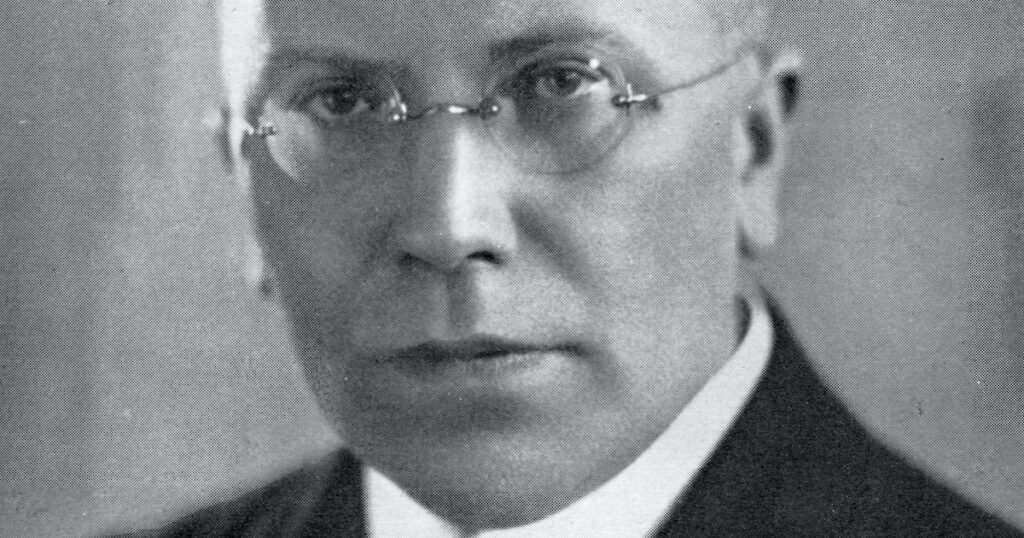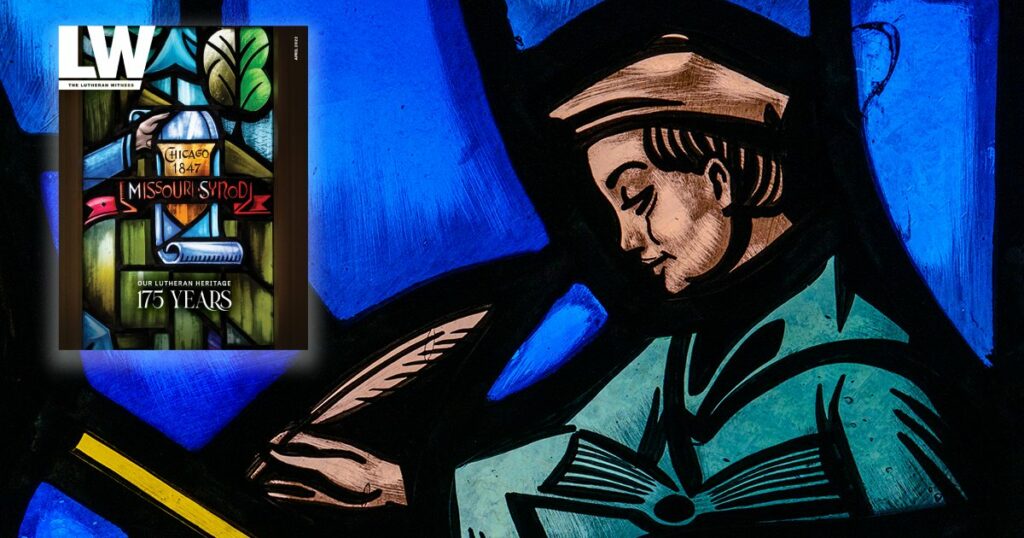Elizabeth of Hungary
1207–1231
Born a princess, she shunned her wealth to serve God by caring for the poor and needy.
In this series, Lutheran historian Molly Lackey will trace the history of the church, from the time of the apostles through the twentieth century. As the Body of Christ, our history transcends time, country and citizenship: “God’s Word is our great heritage.”

Imagine you are a beggar in 13th century Germany, owning only the clothes on your back, dizzy with hunger, lying on the side of the road in the city of Marburg. It looks like rain, and you don’t know how much more of this you can bear. Your chest aches as you cough, and you hope that the painful sores over your face and body don’t scare off any would-be benefactors. You’ve been praying for days, weeks, that something would change, some miracle would turn your life around. Doesn’t Our Lord say something about caring for the poor, sick and hungry? Or is the fear stalking your heart true — that maybe it’s some other, more deserving and pious poor, sick and hungry person whom God truly loves?
Tears of utter despair well up behind your eyes, when a furtive figure darts out from a side street — just what you need, a thief, like you even have anything worth stealing. The small figure approaches, revealing a young woman, a girl, really, wrapped in a dark cloak. She looks familiar, though you can’t quite place her. “Are you hungry?” she asks in a bright and polished voice. You nod, straining to sit up from your place on the street. She produces a sack from underneath her cloak and places it by you. “Do you have anything to wear in this rain?” she again asks as cold drops begin falling. You shake your head and watch her remove her cloak — to your surprise, she is wearing a sumptuous robe underneath, dark purple wool and fastened in gold. She places it on top of you, then drapes the darker cloak over that, so as not to draw attention to your prone and defenseless form. “I will send for someone to carry you to the Franciscan hospital,” she says, standing back up. She wears a simple dress, but something about her features, and her posture, and her voice — it doesn’t match up, but it’s so familiar. “God be with you, dear one.” She runs back down the street she came from. As warmth floods your body — and the bread in the bag she left fills your stomach — a question leaps into your mind: Wasn’t that the princess Elizabeth? What was she doing in a back alley like this, with someone like you?
From prayerful princess to servant of the poor
Elizabeth was born in Hungary in 1207 to King Andrew II and Queen Gertrude, his German bride. When Elizabeth was only six years old, her mother was assassinated, although by this time Elizabeth had already been moved to Thuringia, Germany, with a substantial dowry as part of a planned marriage to Louis IV, Landgrave of Thuringia. Louis, only seven years her senior, was likewise a child.
Elizabeth’s childhood was marked by a deep piety, despite growing up in a cosmopolitan royal household, a venue of German courtly love poets and a bubble of wealth and decadence, insulated from the hardships borne by so many from want, poverty and illness at the time. She was constantly at prayer and in church, and she conducted herself with modesty and charity. Her royal companions mocked this behavior, though her soon-to-be husband must have been supportive: The pair married when she was 14 and he was 21, and he encouraged and defended her work with the poor.
Elizabeth was encouraged in her piety and charity work by the presence of the Franciscans, friars following the example of Francis of Assisi. She followed their example and distributed much of her wealth to the poor. According to the Golden Legend, a medieval source describing the lives of popular saints, she distributed bread to the hungry, spun wool with her chambermaids to clothe the naked, sold her jewelry and gave the proceeds to the poor, gave away her fine clothing, founded a hospital, cared for lepers, distributed grain during famines, and paid for and attended funerals and burials of the poor. This charitable work intensified after the early death of her husband, who died of the plague at age 26 on the way to the Sixth Crusade.
An example of selfless love
Now a widow, Elizabeth embraced a life of celibacy and charity, taking vows to live like a Franciscan nun, though she never actually joined a convent. All this she did under the guidance of Konrad von Marburg, her priest and father confessor. Konrad appears to have engaged in the extreme asceticism the Reformation would later question, and he apparently expected Elizabeth to do likewise. He made her send her children away, and he severely beat her on at least one occasion. She received harsh treatment from her own family, too: At one point, she was functionally held hostage in her uncle’s castle in an attempt to force her to remarry for political gain. It is not surprising, under these conditions, that Elizabeth died at only 24 years old after a brief illness.
Elizabeth was — and remains — a very popular saint within Germany, especially in Thuringia, a region that borders Luther’s Saxony, and in Marburg, home of a Gothic church named in her honor and the site of Luther’s famous debate with Ulrich Zwingli. Philip I, Landgrave of Hesse, a supporter of the Reformation, was also one of her descendants. This perhaps explains why she has historically remained popular with Lutherans. Some 800 years later, she remains a powerful example of selfless love for neighbor, especially those hurting most. May we, like Elizabeth, not be caught up in idolatrous pursuit of wealth and power, but rather use whatever resources God has given us to care for our brothers and sisters.
Editor’s Note: The next installment of this series, on the influential Christian philosopher Thomas Aquinas, will be posted two weeks from today. Check back then or follow us on social media to catch it!
Image: “St. Elisabeth,” Hans Holbein, c. 1516.







This is a wonderful story of true faith and piety in the face of unspeakable horrors of the Black Death and the barbarous Crusades. We give thanks to God for Elizabeth of Hungary 🇭🇺
Of all the titles bestowed on people in reflecting on their lives, none is more apt than to simply be identified as a “servant of the Lord.” True Christianity has always been seen in works, not mere words alone, as the Holy Spirit moves believers to act on their faith. Of course, works do not save. Salvation is by grace alone, but like Elizabeth, the transformation of the inherently carnal soul to a selfless servant reflects the meekness and glory of Christ. Soli Deo Gloria